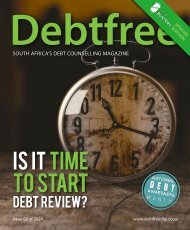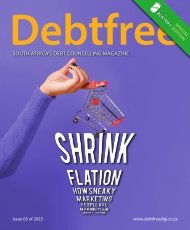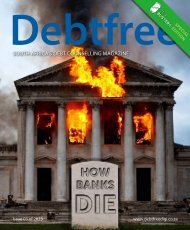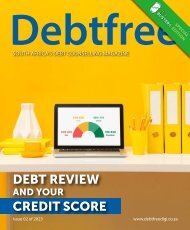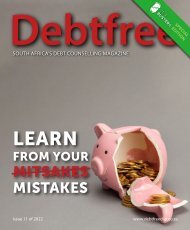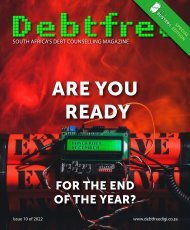Create successful ePaper yourself
Turn your PDF publications into a flip-book with our unique Google optimized e-Paper software.
STRESSED?<br />
WAYS TO COPE<br />
Issue 3 of <strong>2021</strong>
EXCELLENCE IS DOING<br />
ORDINARY THINGS<br />
EXTRAORDINARILY<br />
WELL<br />
– John W. Gardner
WHAT MAKES US<br />
EXCELLENT?<br />
/ Unimpaired and automated PDA systems<br />
/ Integration with top-ranked Debt Counsellor systems<br />
/ Enhancing Debt Counsellor efficiency and sustainability<br />
/ Best customer support in the country – queries are resolved within 24 hours<br />
/ Strong compliance and best-industry-practice implementation is at our centre<br />
Call Chris van der Straaten<br />
Head of Hyphen PDA | 082 557 0437<br />
Or call our friendly support centre on 011 303 0060 - Option 2<br />
or visit our website www.hyphenpda.co.za
FROM THE<br />
<strong>IDM</strong> DESK
THREE STEPS TO TAKE CONTROL OF<br />
YOUR FINANCES IN UNCERTAIN TIMES<br />
With the turmoil of 2020 behind us and a return to something<br />
approaching normal in the first quarter of <strong>2021</strong>, now is a good time to<br />
take stock of your finances.<br />
DebtBusters have seen at first-hand how the consecutive lockdowns and<br />
government’s attempts to try and control the spread of Covid-19 and<br />
the associated economic slowdown and uncertainty have affected most<br />
people’s finances.<br />
“Obviously, the consequences were most significant for people who<br />
were retrenched, lost their jobs when businesses failed and those who<br />
were self employed in sectors such as hospitality and tourism, where<br />
opportunities to earn an income diminished or entirely disappeared,”<br />
says Benay Sager, Head of DebtBusters.<br />
For those who kept their jobs, payment holidays and successive repo<br />
rate reductions provided relief, but in many cases, these were offset by<br />
salary cuts and bonus and other payments that were either substantially<br />
reduced or not paid at all.<br />
The 7% contraction in the economy during 2020 was not as bad as some<br />
experts had predicted and the 6.3% growth rate in the fourth quarter<br />
is encouraging, but the country’s economy was struggling to achieve<br />
meaningful growth even before the pandemic and isn’t out of the woods<br />
yet.<br />
DebtBusters cautions against complacency even if you’ve been lucky<br />
enough to keep your job, managed to sustain an income throughout the<br />
disruption or are now able to start earning again.<br />
“Although things may seem to be returning to normal, it’s still a very
difficult and uncertain environment. While there’s nothing you can do<br />
about external factors such as a third wave, by controlling what you can<br />
you’ll put yourself in a better position to deal with any setbacks as the<br />
economy starts to recover.”<br />
These following three steps are suggested:<br />
1. Assess where you stand financially<br />
Do an honest assessment of your financial situation. It may sound<br />
daunting, but other than taking a bit of time it’s easy thing to do and will<br />
give you a perspective on where you are, help you set some goals and<br />
keep track of progress.<br />
There are plenty of financial online tools available to help you such as<br />
www.debtbusters.co.za/tools-and-advice/budget-calculator/<br />
Alternatively divide a sheet of paper into two columns and list all your<br />
income in the left column and all your expenses on the right.<br />
Be as honest and thorough as you can. Your bank statements for the past<br />
few months, bills and receipts can all help build an accurate picture of<br />
how much you’re spending and on what.<br />
It should give you an idea of where you may be able to reduce some<br />
expenses, which debts to pay off – ideally start with short-term debts with<br />
the highest interest rates – and take more control of your finances.<br />
Ideally you should do the exercise each month, but at least every quarter.<br />
Having done it once it’ll take you less time when you do it again.<br />
2. Set goals<br />
These will differ for everyone depending on your circumstances. For<br />
some it may be planning to pay off short-term or unsecured debt, for<br />
others it could be starting an emergency fund to cover unexpected<br />
future expenses, while those with some disposable income may consider<br />
investments as a good way to grow their money.
The important thing is to be realistic. Setting achievable goals and<br />
meeting them will encourage you to keep trying. It’s better than setting<br />
yourself a huge challenge, getting disheartened and ultimately achieving<br />
nothing.<br />
It may be as simple as settling an account or outstanding debt. Start<br />
with the one with the smallest balance. Once you’ve paid that off, begin<br />
replaying the next smallest one and so on.<br />
Eventually you may get to a position where you’re able to save some<br />
money each month. Then you might open a tax-free savings account and<br />
see how close you can get to saving the maximum R36 000 a year which<br />
SARS allows tax free.<br />
3. Don’t delay if you need help<br />
If your assessment finds that your monthly expenses exceed your income<br />
and you can’t find a way to rectify this, you may need expert help.<br />
All reputable debt counsellors provide free debt assessments. This will<br />
show whether or not you need to consider a debt-management solution<br />
such as debt counselling.<br />
“Avoiding or ignoring the problem is a common reaction when people<br />
are struggling with debt and have fallen behind on paying for a home<br />
or a vehicle, but it’s not a solution. There are options, but it’s important<br />
to act before you face the possibility of having your house or car<br />
repossessed,” says Sager.
POPI-PROOF<br />
your PROCESSES<br />
WITH DREX<br />
Secure system-to-system data transfer<br />
(no human contact)<br />
Elimination of data exposure from the<br />
use of email<br />
Data specification is fit for purpose<br />
^<br />
DID YOU KNOW?<br />
The President of South Africa has proclaimed the POPIA commencement date to be 1 July <strong>2021</strong>.<br />
POPIA applies to any company or organization processing personal information in South Africa.<br />
Fines for non-compliance with POPIA can range up to 10 million ZAR (South African rands).<br />
POPIA defines personal information broadly as any information relating to not only a living person,<br />
but also a company or legal entity.<br />
^ ^ ^
FROM THE EDITOR<br />
This month, we get to celebrate the 1 year anniversary<br />
of the short, but essential, 14 day lockdown due to<br />
Covid-19.<br />
A whole year…Wow! Can you believe it?<br />
A year ago, if you saw people wearing masks, you ran away from<br />
them thinking they were crooks. Now, we run away from people not<br />
wearing masks, in case they make us sick, how times have changed.<br />
Will we celebrate a year of lockdown, or will we cry into our cups<br />
bitterly thinking of all we have lost? It hardly seems like something to<br />
celebrate.<br />
It has been a really tough 12 months, that’s for sure. Last year 2.2<br />
million people lost their jobs (and even though many got them back<br />
as time went by and restrictions lifted) there are now 17.9 Million<br />
people in SA who are unemployed. That’s one out of every 3 people<br />
in the country. Tough times indeed.
Over 50 000 people have lost their lives and more than 1,500,000<br />
are dealing with the after-effects of the virus. Even though vaccines<br />
are becoming available, many have valid concerns; how effective and<br />
safe are they, and how they are rolling out worldwide. It is all very<br />
stressful.<br />
That’s a topic we have a look at this issue: how you can deal with your<br />
stress. Now, admittedly you are never going to escape stress entirely,<br />
but we discuss how to get it under control. You might even pick up<br />
some practical ways to reduce your stress levels.<br />
We also discuss something that stresses a lot of people out: a review<br />
of the fees for debt counselling. We look at what was done in the<br />
past, and challenges with this process moving forward. It is a complex<br />
riddle that faces those in the industry - finding a balance between<br />
the costs of offering extremely professional help, and still not<br />
overcharging the credit providers and consumers for the process.<br />
We also look at local and international news impacting our finances.<br />
It’s good to keep your finger on the pulse. Add to that the usual mix of<br />
advice, tips, reviews and more.<br />
It is funny how a full year of the Pandemic seems both long and short.<br />
Time has dragged on, painfully slow and yet it has also flown by. It is<br />
a lot like being in debt review, the process seems to take forever. You<br />
feel like you are not making any progress and then suddenly, boom,<br />
you have paid up all your debt. Wouldn’t that be something worth<br />
celebrating? Imagine finally becoming completely debt free.
ONLINE<br />
12 April 21<br />
National Credit Regulator<br />
Debt Counselling Training Course<br />
CLICK HERE TO ENROL<br />
Contact us for more info: 012 434 2500<br />
www.enterprises.up.ac.za
CHEAPER OR MORE<br />
EXPENSIVE?<br />
Stats SA tracks many things including the rate of<br />
inflation in SA. They can also look ahead and predict<br />
what things will soon cost more or less based on<br />
current trends.<br />
Here are a few things that we can expect to cost more over the next<br />
few months due to things like rising fuel costs and the Rand losing<br />
strength to the Dollar.<br />
Food<br />
Fuel<br />
Electricity<br />
Alcoholic & Non Alcoholic Beverages<br />
Tobacco<br />
New Vehicles<br />
By comparison here are the things where prices are staying the same<br />
or possibly even dropping:<br />
Education<br />
Medical Insurance<br />
Clothing<br />
Rent
COPING WITH STRESS<br />
C<br />
NEWS<br />
DEBT<br />
COUNSELLING<br />
FEES<br />
O<br />
NTENTS<br />
DEBT REVIEW<br />
SCHOOL<br />
20%<br />
DISCLAIMER<br />
Debtfree Magazine considers its sources reliable<br />
and verifies as much information as possible.<br />
However, reporting inaccuracies can occur,<br />
consequently readers using this information do<br />
so at their own risk. Debtfree Magazine makes<br />
content available with the understanding that<br />
the publisher is not rendering legal services or<br />
financial advice. Although persons and companies<br />
mentioned herein are believed to be reputable,<br />
neither Debtfree Magazine nor any of its<br />
employees, sales executives or contributors accept<br />
any responsibility whatsoever for their activities.<br />
Debtfree Magazine contains material supplied to<br />
us by advertisers which does not necessarily reflect<br />
the views and opinions of the Debtfree Magazine<br />
team. No person, organization or party can copy<br />
or re-produce the content on this site and/or<br />
magazine or any part of this publication without<br />
a written consent from the editors’ panel and the<br />
author of the content, as applicable. Debtfree<br />
Magazine, authors and contributors reserve their<br />
rights with regards to copyright of their work.
CONSUMER FRIEND<br />
USES<br />
SOFTWARE TO ENSURE<br />
POPIA COMPLIANCE!<br />
- Secure system-to-system data transfer (no human contact)<br />
- Elimination of data exposure from the use of email<br />
- Data specification is fit for purpose<br />
POPIA COMPLIANCE IS<br />
CRUCIAL THIS YEAR!
BREAKING<br />
NEWS
1 IN 3 PEOPLE UNEMPLOYED<br />
In South Africa, as the lockdown began (between April and<br />
June – the initial Lockdown Period) 2.2 million people lost<br />
their jobs. Over time, as lockdown restrictions eased, +-<br />
900 000 unemployed people were slowly able to get old<br />
jobs back or find new jobs.<br />
By the end of the year however, 1.3 million people, out of<br />
those roughly 2.2 million, were still unemployed. They joined<br />
the 16.6 million other already unemployed people in SA.<br />
SA now has it’s highest unemployment rate, sitting at 32.5%.<br />
This puts SA’s unemployment rate in the Top 3 of countries<br />
around the world (among countries that report on such<br />
stats). Although different countries report in different ways<br />
and figures vary over time the reality does not change that<br />
SA is one of the most unemployed places in the world.<br />
In further bad news a recent business survey of over 4377<br />
SA businesses revealed that these companies have plans to<br />
retrench another 1.3 million members of staff in the next 6<br />
months.
We are the champion<br />
in your corner!<br />
DebtBusters provides a remedy for financially stressed<br />
consumers through effective debt relief solutions.<br />
Over 1 million South Africans who are facing tight<br />
budgets and are struggling with debt, have come to<br />
DebtBusters looking for a financial solution.<br />
086 999 0606<br />
info@debtbusters.co.za<br />
www.debtbusters.co.za
MAN CAUGHT WITH<br />
70 SASSA CARDS<br />
A 47-year-old Durban man has been caught by the SAPS<br />
at an ATM with over 70 SASSA cards in his possession. The<br />
man had been drawing cash from the various accounts<br />
when he was arrested. The man was acting as an illegal<br />
credit provider and has illegally been taking the SASSA cards<br />
from those who receive grants to repay loans. When the<br />
man was arrested he had over R7500 in cash on him. His<br />
fancy Mercedes-Benz was also seized by the police as part<br />
of the arrest.<br />
REPO RATE UNCHANGED<br />
After this week’s SA Reserve Bank Monetary Policy<br />
Committee meeting South Africans can let out a small sigh<br />
of relief. The Repo Rate, which currently sits at a record low<br />
of 3.5%, is not going to change for a little longer. This means<br />
no immediate increase in debt repayments for those who<br />
have credit. Repo Rate: 3.5%
8 MORE VBS LOOTING<br />
ARRESTS MADE<br />
Millions of Rand was looted from VBS Mutual Bank in one<br />
of the most shocking South African Banking scandals of all<br />
time. In the wake of the story breaking and reports into what<br />
happened at the bank 7 people were arrested for their role<br />
in the looting and fraudulent activity at the bank.<br />
The case against these 7 has already been postponed as<br />
more and more charges get added to the rap sheet of illegal<br />
activity they were part of.<br />
Now an additional 8 people have been rounded up in a<br />
new wave of arrests. The new arrests also relate to fraud,<br />
corruption, money laundering and racketeering at the bank<br />
and related municipalities who were involved.<br />
The investigators are planning even more arrests as the<br />
evidence mounts against those involved.
DEBT REVIEW<br />
EXPECTATIONS<br />
VS REALITY<br />
STRESSED?<br />
WAYS TO COPE
COPING WITH STRESS<br />
INTRODUCTION<br />
We all face stress; work stress, debt stress, stress over<br />
our health, the pandemic and more. To cope with<br />
stress we need to think about how we think about<br />
stress.<br />
Let’s consider some ways we can adjust our thinking about stress, and<br />
find better ways to cope and perhaps even reduce our stress levels.
COPING WITH STRESS<br />
DEBT STRESS<br />
Stress about money, money problems and debt is<br />
extremely common. Concerns about money often lead<br />
to the break-up of families, poor performance at work<br />
and sleeping problems.<br />
One thing that we can do to adjust how we think about debt stress is<br />
to consider who really has the problem. If you loan your friend R1000<br />
and they cannot pay you back when you really need the money, who<br />
has the bigger problem?<br />
You, who gave the money and now needs it back; or Them, who<br />
spent the money and now really cannot pay you back, at this time?<br />
The person who loaned the money, but now needs it back, has the<br />
real problem. This is true in most creditor/debtor situations. If you<br />
have borrowed money from the bank, and made use of those funds<br />
to buy things, but now cannot repay them, the bank is the one with<br />
the real problem, not you. This is why collections agents and the<br />
courts are used, to attempt to shift the problem from them onto you.<br />
Repeated calls and pestering is an effective way to get you to think<br />
the problem is primarily yours, when in fact, it is mostly the credit<br />
provider’s problem.<br />
Thinking about things in this way can help you adjust your view<br />
of your situation, and lower your stress levels, while you make<br />
reasonable plans to repay the debt.
COPING WITH STRESS<br />
STOP STRESSING<br />
OVER THINGS YOU<br />
CANNOT CONTROL<br />
Each day we are confronted by things (small or<br />
large) that stress us out. It is best to focus on these<br />
immediate stressors, and not go about adding to these<br />
things by worrying about future things that may never<br />
actually happen.<br />
Sure, you can somewhat influence the future by making wise<br />
decisions now, but you cannot control how others will act. You<br />
cannot control what the Corona Virus might do or how governments<br />
might adjust legislation or how credit providers might behave.<br />
Rather, it is best to deal with the actual issues in front of you today.<br />
Do not weigh your brain down by worrying over things that you<br />
cannot control and might never actually happen.
COPING WITH STRESS<br />
BE REASONABLE<br />
We often have high standards for ourselves and others.<br />
Sometimes, however, these standards can be too high<br />
and unrealistic. These high expectations could cause<br />
us to become unhappy with ourselves or with others<br />
when they always fall short of our expectations.<br />
It is better to set reasonable standards for yourself. Know your<br />
limitations and live up to them, only then try to see if you can go a<br />
little beyond them. You would not ask a baby to do backflips at the<br />
Olympics would you? That would be unrealistic.<br />
Over time, as you slowly learn and grow, you can adjust and set new<br />
realistic goals and standards for yourself and others.<br />
Try to keep a positive, forgiving attitude and maintain a sense of<br />
humour about things, especially when times are tough.
COPING WITH STRESS<br />
LEARN TO IDENTIFY<br />
YOUR STRESS<br />
One key in learning to cope with your stress is to learn<br />
to identify what it is that is stressing you.<br />
Some of the main causes of stress may seem obvious to you: debt,<br />
work, family. But that’s actually very vague. There are many people<br />
who have debt and are not stressed about it. There are many people<br />
who work a lot, but love their jobs. There are many people who have<br />
big families but do not get stressed by them.<br />
So, it helps to be more specific, what exactly at work is stressful,<br />
which part of the workday? What specific behaviour by family<br />
members causes you to feel stressed out?<br />
It is also important to note that what stresses one person may not be<br />
stressful to the next. You are an individual and your stress is unique.<br />
So, you can’t rely on others to identify your causes of stress, you need<br />
to take some time and actually think about it.<br />
Once you know exactly what it is that stresses you out (in the<br />
different parts of your life) then you can start to make plans to reduce<br />
your exposure to these sources of stress.
COPING WITH STRESS<br />
GET ORGANISED<br />
Our brains secretly like things to be organized. We<br />
find it pleasing to be in a neat and tidy house or room.<br />
We even like people whose faces are balanced and<br />
symmetrical.<br />
Our brains also like things not only start but get finished. Disorder, in<br />
our surroundings or our daily routine can be a big background source<br />
of stress.<br />
Try to get organized, make a schedule, stick to it. Make a list of all the<br />
many things you need to get done and when you finish something,<br />
tick it off. This will help you better manage your stress and avoid<br />
being overwhelmed by too many things going on at once.<br />
Having a list will also help you to choose which things are most<br />
urgent and most important and which things you can leave to<br />
another time. This is especially helpful if you tend to procrastinate.<br />
Once you know exactly what it is that stresses you out (in the<br />
different parts of your life) then you can start to make plans to reduce<br />
your exposure to these sources of stress.
COPING WITH STRESS<br />
FINDING BALANCE<br />
If you work all the time, your family life will suffer. If<br />
you play all the time your finances will suffer. So, try to<br />
find a balance between work and relaxation.<br />
People who eat healthy, sleep well and have good relationships with<br />
others, they tend to be more productive and effective at their jobs<br />
(even in shorter time periods).<br />
Doctors will tell you that a little exercise goes a long way to having<br />
good mental health. Eating and living healthy can help you avoid<br />
many common traps, like returning to bad habits to try deal with<br />
stress.<br />
If you find your mental health is very poor, and you are having<br />
negative thoughts all the time, then speak to a friend and to a medical<br />
professional. Don’t delay getting help, seeking help is a smart move<br />
and not a failure.
COPING WITH STRESS<br />
PRIORITISE<br />
As mentioned earlier there are benefits to making lists,<br />
they can help you to quickly set priorities.<br />
We often make lists and priorities in the back of our minds. Which<br />
is more important to pay? Your home loan or your short term loan?<br />
Your brain will quickly compare the two, as well as, the consequences<br />
of not paying and tell you to protect the place where you live.<br />
Making a list on paper (or digitally) will help you see all the things you<br />
need to accomplish and decide which ones need to be done today,<br />
tomorrow, next week or never. Cross off the ones you complete, and<br />
then make a fresh list in a day or two and reorganize the items left<br />
over. Some people do this daily and it helps them a lot!<br />
Be sure to schedule time to relax, taking short breaks can energise<br />
you and reduce stress.
COPING WITH STRESS<br />
GET HELP<br />
If you are very stressed, then your family and friends<br />
can be a great comfort. Finding someone you can trust<br />
and who is a good listener is very helpful in reducing<br />
stress.<br />
Why not ask people to help you with some of your many tasks or with<br />
your workload? Even your kids can help around the house with small<br />
things, which will make life easier.<br />
If one of your work colleagues is a source of stress, can you have a<br />
calm conversation with them in a relaxed environment and talk about<br />
the exact reasons why they cause stress, and ask them if you are<br />
stressing them out? If you can’t get that right, you can always try to<br />
adjust things so you deal with them less often.<br />
As mentioned previously, if you are too stressed out and cannot deal<br />
with things on your own, get professional assistance. For example<br />
if your debt is stressing you out, why not talk to a professional Debt<br />
Counsellor. Having relationship problems? Have you spoken to a<br />
counsellor? Do you need medical assistance to deal with your stress?<br />
Ask for help if you need it.
COPING WITH STRESS<br />
YOU CAN COPE<br />
When you feel overwhelmed by too many things it can<br />
be very stressful.<br />
If however you can sit down and make a list of things you need to get<br />
done, can take time to identify exactly what things are stressing you<br />
out, and can then adjust your day-to-day routine to deal with those<br />
issues, you will feel a lot more in control.<br />
Talking to a friend or professional can also help you see things from<br />
a different perspective. If you need help and get the assistance you<br />
need, it will also greatly reduce your stress levels.<br />
We can’t totally avoid all forms of stress, but by taking a few practical<br />
steps, you can reduce and manage the things in your life that cause<br />
you stress.
NCR FEE<br />
GUIDELINE TO<br />
BE REVIEWED
INTRODUCTION<br />
The National Credit Act (NCA) came into effect all the<br />
way back in 2007. The Act and regulations mention<br />
fees that might be charged for debt counselling but<br />
remained silent on what these fees might specifically<br />
be.<br />
Since there is no official (or legislated) fee structure, the industry itself<br />
had to come up with figures that the majority felt were reasonable,<br />
and would cover the associated costs.<br />
Over time, various parties have come up with their own fee structure<br />
and guidelines. For example, the Debt Counsellors Association of<br />
South Africa (DCASA) issued a very popular fee structure which its<br />
members and many others followed for some time.<br />
The National Credit Regulator (NCR), who regulate the credit industry,<br />
has also weighed in on the topic by producing guidelines on what<br />
they feel is a reasonable fee structure. These NCR issued guidelines<br />
have been the most popular (including among credit providers and<br />
their DCRS software) and are currently followed by major industry<br />
role players.
NCR FEE GUIDELINE TO BE REVIEWD<br />
DCASA & THE NCR<br />
FEE GUIDELINE<br />
When the industry first started in 2007, the Debt<br />
Counsellors Association of South Africa (DCASA)<br />
fee guideline was perhaps the widest accepted fee<br />
structure.<br />
This changed however when, after a few years, the Competition<br />
Commission said it was unfair for Debt Counsellors who did not<br />
belong to the association, to have to stick to association specific fees.<br />
This led to the NCR stepping in and issuing a very similar guideline<br />
for Debt Counsellors (with some increases in the fee amounts). They<br />
also asked Debt Counsellors to voluntarily accept these fees, as part<br />
of their conditions of registration, and as part of the industry code of<br />
conduct.<br />
The NCR made their view on the voluntary nature of their guideline<br />
clear when they said: ‘It is therefore the considered view of the NCR,<br />
as the custodian of the credit industry, that all debt counsellors are<br />
required to comply with the Fee Guidelines for Debt Counsellors,<br />
which were issued by the NCR in 2011 so as to ensure that the<br />
industry-agreed payment process is implemented uniformly<br />
throughout the debt counselling industry.’
NCR FEE GUIDELINE TO BE REVIEWD<br />
HOW DO DEBT<br />
COUNSELLING FEES<br />
WORK?<br />
MONTH 1<br />
A simple way to think about debt counselling fees is, that for most<br />
consumers, half of all fees they ever pay for the process are paid to<br />
the Debt Counsellor in Month 1 of the process (not upfront but when<br />
the consumer starts to pay the new, reduced amount for all their<br />
debts).<br />
This has lead to a natural focus by Debt Counsellors on getting<br />
consumers through Month 1 of the process.<br />
EACH MONTH<br />
The rest of the fees then come in small monthly payments during the<br />
process. This small monthly retainer (which fund ongoing work and<br />
reviews in the future) is known as an ‘after-care’ fee.<br />
Over the years, the industry average has shifted up and down, with<br />
each consumer’s situation being unique, but as an industry average<br />
most consumers pay around R125 a month in after-care fees.
NCR FEE GUIDELINE TO BE REVIEWD<br />
WHY WOULD FEES<br />
NEED TO INCREASE?<br />
The process that was at first expected to be simple,<br />
where all parties would voluntarily cooperate has, over<br />
the years, proved to be quite complicated.<br />
In fact, due to push back from credit providers initially, the process<br />
became very complicated and many additional steps had to be<br />
introduced to account for their resistance.<br />
Since 2009, the Courts have been included in every debt review (as<br />
opposed to only being needed where one credit provider isn’t happy).<br />
This meant that the initial fee guideline for debt counselling had to be<br />
adjusted.<br />
The inclusion of the courts and the legal side of things introduced<br />
another snag. Attorneys do not fall under the authority of the NCR,<br />
and because the Act and Regulations do not set out fees, it was left<br />
up to Debt Counsellors and Attorneys to negotiate with consumers<br />
about how much would be needed to cover legal fees.
NCR FEE GUIDELINE TO BE REVIEWD<br />
THE CHALLENGE<br />
WITH LEGAL COSTS<br />
It is a hard thing to know up front if all credit providers<br />
in a matter will or won’t agree with the proposals.<br />
They may want to fight about things in court, or the<br />
majority of the credit providers might like a proposal<br />
but one may decide to fight.<br />
Different courts have different requirements, which also complicate<br />
things and Attorneys may end up going back to court over and over<br />
about the same case (pushing up the amount they will bill). It is not a<br />
simple thing to know what the costs will be.<br />
To try to simplify things, many Debt Counsellors tried to make deals<br />
with Attorneys to provide a set ‘standard fee’ which consumer’s (and<br />
credit providers) could budget for in advance. This led to further<br />
problems, as some consumer’s cases were simple while others were<br />
complex. Did this mean that the Attorney was using some funds from<br />
the simple cases to cover the costs for the complicated ones? The<br />
consumer and Debt Counsellor were not privy to that information,<br />
allowing each Attorney to run their billing differently.<br />
Still, for a time, having a set standard amount for legal fees helped<br />
give clients quotations and helped the Debt Counsellors and Courts<br />
make debt restructuring calculations.
NCR FEE GUIDELINE TO BE REVIEWD<br />
DCASA RESEARCH<br />
IDENTIFIED A HUGE<br />
PROBLEM<br />
DCASA Research, presented back in 2014, revealed<br />
a growing problem in the industry. It was becoming<br />
more expensive for Debt Counsellor to help people<br />
and the fees had not increased in several years.<br />
To stay in business, Debt Counsellors were progressively paying their<br />
staff less and less money. Debt Counsellors themselves were also<br />
drawing smaller and smaller monthly salaries (an average of +- R11<br />
000 in 2014). It also revealed that the process was now taking more<br />
than twice as long as it had back in 2009.<br />
This critical research revealed that reckless credit investigations would<br />
extend the amount of work Debt Counsellors did, by at least 100% if<br />
even a single case of reckless credit was possibly involved.
NCR FEE GUIDELINE TO BE REVIEWD<br />
2016 CHANGES<br />
In 2016 the NCR made some adjustments in their<br />
guideline to the top end limit that could be charged of<br />
the very small number of clients who ended up being<br />
able to pay a lot of money each month toward their<br />
debt.<br />
Some other caps were also increased.<br />
The guideline also solidified the idea that consumers who started,<br />
but don’t carry on with the process, should pay for work already<br />
completed by the DC (75% of the restructuring fees).<br />
In that year, they also introduced what they rather controversially<br />
labeled a ‘Legal Fee’. While the fee was indeed used towards legal<br />
costs, the various legal bodies and entities already had official legal<br />
fee rules, and the term in the guideline was seen by some as stepping<br />
on their toes (or worse). It also highlighted the problem of a Regulator<br />
trying to regulate an industry they had no direct authority over.
NCR FEE GUIDELINE TO BE REVIEWD<br />
PROMOTING<br />
RECKLESS CREDIT<br />
INVESTIGATIONS<br />
The NCA aims to reduce credit providers giving<br />
consumers credit that they cannot actually afford. The<br />
Act introduced big fines to the credit providers who<br />
continued this practice known as reckless credit.<br />
The Act also required that consumers be give documents they could<br />
properly understand, that consumers be told exactly what they will<br />
pay in advance and that credit providers would take proper steps to<br />
do the math and ensure that consumers could afford the credit. To<br />
fail to do so is also called ‘reckless credit’.<br />
The threat of a credit provider being caught out for reckless credit<br />
scares investors and shareholders. The NCR has been able to take<br />
action against various credit providers who break these rules. This is<br />
also something that scares investors. A famous case was where (old)<br />
African Bank themselves reported that they had a small number of<br />
reckless credit cases, originating at one of their KZN branches. Soon<br />
afterwards the entire bank collapsed as shareholders ran for the hills<br />
and stock prices fell through the floor*.<br />
*There were other factors like a big book of bad paying debtors and company leadership jumping ship.
NCR FEE GUIDELINE TO BE REVIEWD<br />
RECKLESS CREDIT<br />
CASES IN COURT<br />
Because of the need to keep investors happy and avoid<br />
big fines, credit providers are quick to bring in big legal<br />
teams to fight about any mention of possible reckless<br />
credit.<br />
This results in big legal battles at court, where the legal fees can<br />
quickly exceed the actual amount owed. It makes sense to fight over<br />
possible reckless lending for a R3000 loan and bring in a legal team<br />
that will cost R50 000 to avoid receiving a fine of R1 million and<br />
having your share holders get scared off, costing big credit providers<br />
millions of rand in value.<br />
Unfortunately there is no provision in current guidelines about where<br />
these big additional legal fees should come from.<br />
Some credit provider’s attorneys are unfortunately quick to ask for<br />
costs against a Debt Counsellor who does their legally obliged job<br />
if they mention possible reckless credit. Such fees could quickly put<br />
smaller Debt Counsellor practices out of business.
NCR FEE GUIDELINE TO BE REVIEWD<br />
AMENDING THE<br />
ACT TO INCLUDE<br />
COMPULSORY<br />
RECKLESS CREDIT<br />
INVESTIGATION<br />
The current wording of the NCA only calls for such<br />
investigations if the consumer expressly asks about it.<br />
This has resulted in reckless credit not being a major part of debt<br />
review. New provisions were included in amendments to the National<br />
Credit Act a few years back. The changes require all Debt Counsellors<br />
to investigate all accounts, and report to the court in each matter<br />
whether asked to do so or not.<br />
It also makes it a punishable offence for Debt Counsellors not to do<br />
so. This was seen by many as the last step in getting rid of smaller<br />
Debt Counsellors in favour of larger practices who could afford to do<br />
this. Regardless, these amendments have never actually come into<br />
effect, for some reason.
NCR FEE GUIDELINE TO BE REVIEWD<br />
FEES TO<br />
INCENTIVIZE<br />
RECKLESS CREDIT<br />
INVESTIGATIONS<br />
In an effort to help promote reckless lending<br />
investigations, the NCR pushed for a small fee to be<br />
included in their 2018 fee guideline in the amount of<br />
up to R1500.<br />
Though this fee is a drop from the bucket towards the real cost, if<br />
reckless credit is found, it was hoped that it would motivate Debt<br />
Counsellors to more actively investigate reckless credit. Since the fee<br />
was introduced, some firms began to charge the fee suggested by the<br />
NCR. This, in many cases, meant that credit providers had to wait a bit<br />
longer to get paid (since these fees were prioritized). Credit providers<br />
immediately began to push back against this fee. They really like to<br />
get paid as soon as possible so the consumers debts don’t grow, due<br />
to the interest rates they add to consumer’s debts, during this time.<br />
The NCR themselves later said they also wanted to take back this fee,<br />
since Debt Counsellors had started to charge it so regularly.
NCR FEE GUIDELINE TO BE REVIEWD<br />
THE COURTS<br />
DON’T ALWAYS<br />
LIKE GUIDELINES<br />
One of the challenges that the NCR, as well as<br />
Debt Counsellors, face is that since the NCA and<br />
Regulations are still silent on the topic of fees for debt<br />
counselling, some Courts have taken the stance that<br />
the NCR’s very popular fee structure guidelines are not<br />
legal and should not be followed.<br />
Some courts even feel it prejudices credit providers or causes default<br />
problems for consumers.<br />
So far this stance has affected only a small number of courts, but has<br />
proved rather difficult for Debt Counsellors who have followed the<br />
NCR’s guideline on fees and been caught in the middle of the issue.<br />
Some of the cases referred to in this article are Case No.A801/2014 Gauteng Division,<br />
Pretoria FNB 7 Nedbank V Barnard & Coetzee. The NCR has however issued a circular saying<br />
that the court probably didn’t mean what it said in its FNB ruling. Also see MFC v Joubert -<br />
A629/2013
NCR FEE GUIDELINE TO BE REVIEWD<br />
REVIEWING THE<br />
NCR FEE GUIDELINE<br />
AGAIN IN <strong>2021</strong><br />
It was decided back in 2020 that a review of the fees<br />
by the NCR’s Credit Industry Forum (CIF) should be<br />
organized. At the start of <strong>2021</strong> this process kicked off<br />
(just the first, baby steps for now) with the committee<br />
beginning to talk about what is needed and agreeing<br />
to certain goals.<br />
What Seems To Be The Problem?<br />
The NCR’s current concerns do not seem to be linked to inflation of<br />
costs or labour. While the entire fee guideline will be up for review,<br />
the NCR, in their CIF document, mention 3 sections of the current fee<br />
guideline in particular that they would like to focus on:<br />
1. The Restructuring Fee (paid in month 1),<br />
2. The Reckless Lending Fee of up to R1500 paid in Month 2,<br />
3. Attorneys Fees (meant to be paid when work is finished),
NCR FEE GUIDELINE TO BE REVIEWD<br />
JUST LIKE IN 2018<br />
The CIF have said that they will follow a process similar<br />
to what was done when the fees were reviewed in<br />
2018.<br />
In that case, a smaller group of people made suggestions that were<br />
converted into an official proposal. That proposal was then nicely<br />
laid out in a document and sent out to the industry (for a few days)<br />
for feedback, and then ended up being published as the new official<br />
guideline.<br />
It was unfortunate that in 2018 there was no upfront consultation at<br />
the beginning of the process. Smaller Debt Counsellors and credit<br />
providers only got to make rushed comments, towards the very end<br />
of the process, on what was seen as a “done deal”.<br />
It is hoped that this time, some attorneys (or legal societies) are<br />
brought in to provide insight into their industry, and that more time<br />
is allowed, earlier in the process, for meaningful proposals and<br />
comments by more people.
DEBT REVIEW<br />
LESSON #1<br />
Even if under debt review credit<br />
providers may have their collections<br />
people call you. You can simply refer<br />
them to your Debt Counsellor and end<br />
the conversation.
NCR FEE GUIDELINE TO BE REVIEWD<br />
A REVIEW IS A GREAT<br />
OPPORTUNITY<br />
Over the years these various guidelines have really<br />
accomplished their goal of creating uniformity, and<br />
have contributed toward stability in the industry.<br />
Though often a bit too complicated, they have also greatly helped<br />
consumers anticipate what to expect to pay, when entering the debt<br />
review process. People want to know what it will cost, this is often<br />
their first questions about debt review.<br />
The current review provides the industry with an important<br />
opportunity to make things both affordable and very easy to<br />
understand for consumers, as well as sustainable for Debt<br />
Counsellors.
CONSUMERS WHO<br />
ENTER DEBT REVIEW<br />
BUT THEN DON’T<br />
FOLLOW THROUGH<br />
In research from DCASA, some years ago, it was<br />
revealed that just short of 20% of clients who enter<br />
debt review never make any payments whatsoever<br />
even though a lot of work is done on their behalf when<br />
they start the process.<br />
This problem still exists today.<br />
This means that 1 in 5 clients never pay a cent for all the time and<br />
effort spent on their behalf.<br />
Imagine how your business would do if one out of every five clients<br />
never paid you for what they bought. It is a scary statistic.<br />
To further add pressure to Debt Counsellors, around another +- 20%<br />
of clients drop out of the process in the following 2 or 3 months and<br />
never complete debt review.
DEBT REVIEW<br />
LESSON #2<br />
If you receive a summons while<br />
under debt review you must not<br />
ignore it thinking you don’t need to<br />
do anything. Immediately call your<br />
Debt Counsellor.






